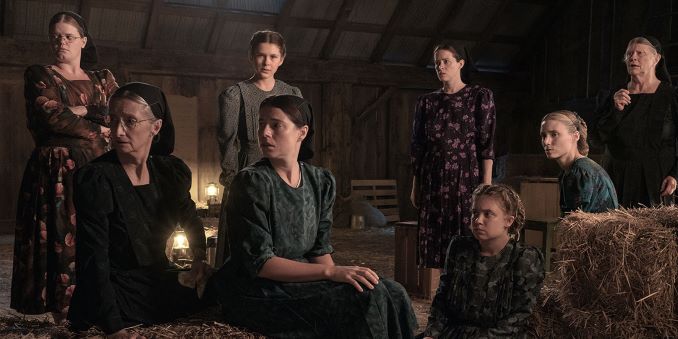As the red carpets roll up, and the detritus of too many street sausages gets swept up along King Street West, it’s time once more to reflect on the cultural beacon that, with apologies to Drake, put Toronto on the map – and continues to keep us there.
This year’s TIFF got off to a crowd-pleasing bang, with opening night selection The Swimmers (dir. Sally El Hosaini) recounting the true story of a pair of teenage sisters who dragged a dinghy of Syrian refugees across the Aegean Sea. The Swimmers is the kind of feel-good, Netflix-ready (it premieres on Nov. 25, 2022) drama that sits well alongside the other big draw of TIFF opening weekend, Steven Spielberg’s The Fabelmans. Judging by the critical and social media reaction – not to mention its predictable win of the TIFF People’s Choice Award ’22 – Spielberg’s fictionalized film memoir, starring Michelle Williams, Paul Dano, Seth Rogen, and David Lynch(?!), is a shoo-in for Oscars glory.
Of course, the real Oscars buzz surrounding this year’s TIFF is all about homegrown talent. Sarah Polley’s excellent, emotionally devastating Women Talking, featuring an all-star cast including Claire Foy, Jessie Buckley, and Rooney Mara, is easily the best fiction feature in former-child star-turned-mature-director Polley’s oeuvre. Delivering precisely on its title, this adaptation of Miriam Toews’s acclaimed novel brings together a group of women in a tightly-knit religious sect to discuss the discovery that the men in their community have been systematically drugging and raping them for years. Based on a real story, Toews’s novel/Polley’s film wisely eschew depictions of male violence, instead centring the women and girls who must find a path forward in the face of horrific trauma. From its opening shot – a young girl narrates their three options: “Do Nothing / Stay and Fight / Leave” – to its heartrending closing, it’s a masterclass in how to tell a difficult story without reducing its subjects to mere objects of pity.
Speaking of decisions about leaving, Park Chan-Wook’s Decision To Leave is an old-fashioned noir masquerading as a modern and decidedly off-beat murder mystery. Chan-Wook’s transition from purveyor of anarchically violent fare like Oldboy (2003) to sophisticated mysteries like the Florence Pugh-starring The Little Drummer Girl (2018) reaches its peak with Decision to Leave, a strange, mystifying tale of a dead husband, a beautiful widow, and the detective who becomes obsessed with her. Echoes of Hitchcock and Billy Wilder abound, even if the plot relies on a few too many contrivances to rank among the truly great noirs.

On the topic of Canadians, Oscars buzz is also growing over Brendan Fraser’s performance in Darren Aronofsky’s The Whale, a film which, by most accounts, is less than the sum of its parts. The Frasernaissance has been rolling for a while now, with memorable turns in Danny Boyle’s Trust (2018), Steven Soderbergh’s No Sudden Move (2021), and the TV series Doom Patrol (2019-present) re-establishing Fraser as an actor with range and charisma to spare. A Best Actor nomination is all-but-guaranteed; whether Fraser’s prosthetics-and-CGI-enhanced performance as a severely obese man will win over enough voters for Oscar gold remains to be seen.
Other highlights from this year’s festival include Werner Herzog‘s Theatre of Thought, an intriguing, occasionally funny documentary about the science and scientists at the forefront of understanding the human brain. Hampered somewhat by silly asides into Matrix-type conspiracy theories, its best scenes are those that depict all the good being done in this field, from computer-aided prosthetic limbs to “mind reading” devices that can interpret the thoughts/needs of seemingly catatonic patients. The unexpected highlight of the film, however, is an out-of-left-field crossover with another fabled documentary, resulting in the year’s most surprising cameo. Is this the creation of a Herzog Cinematic Universe?

It wouldn’t be TIFF without stargazing, and TIFF ’22 has to rank among the most celebrity-filled festivals yet. Lucky partygoers along King West might have caught a glimpse of celebs like Natalie Portman or Bill Nighy (pictured above at the “Jaguar Supper Suite” at MARBL Restaurant, one of countless industry parties last week), while popular restaurants, including several of Toronto’s newly announced Michelin-starred joints, inevitably attracted big names with big pockets.
That said, TIFF 2022 was also plagued by a surfeit of too-big names that attracted a, shall we say, less typical festival audience. While it’s wonderful that, say, Spielberg finally showed up for his first-ever TIFF, the festival undoubtedly hit its nadir when it invited Taylor Swift, of all people, to showcase her new “short film”/music video. The absurdity of a Taylor Swift event was matched only by the poor planning that saw Swifties grind the online ticketing system to a halt while everyone else was just trying to pick up some Herzog and Polley tickets.
TIFF ’22 also saw the returns of some nasty habits that the festival just cannot seem to shake. Once again, TIFF programmers insisted on ratcheting up sound volumes way past reasonable levels, with little respect for audiences or filmmakers. Looking around the screening of Women Talking and the number of people covering their ears thanks to the ear-splitting volume, we couldn’t help but feel sorry for Sarah Polley that her quiet, thoughtful drama was getting the Michael Bay treatment. This is actually a problem at the Lightbox all year round, but TIFF can’t seem to be bothered to do anything about it.
Another returning frustration? As in so many years past, the ticketing system was a total disaster – and that’s not even counting the Swiftie interference. Much like TIFF’s weirdly loud volume levels, the ticketing system is another awful Lightbox trend throughout the year (my favourite part is how clicking a specific showtime just reroutes you to the ticketing home page); the annual festival just shines an embarrassing international spotlight on it.
Speaking of ticket shenanigans, the great sin of TIFF 2022 was the festival’s decision to conspire with scalpers – sorry, “Verified Resellers” – to price gouge fans interested in the hottest events. I saw $80 The Fabelmans tickets reselling for, no exaggeration, $415 on the TIFF website. One would think that TIFF, a not-for-profit funded partly by Canadian taxpayers, would be above this kind of despicable, Ticketmaster-enabled exploitation. Simply shameful.
Those failings aside, this year’s TIFF was, on the whole, another resounding success for Cameron Bailey and his team. The immense range of interesting films from established greats, exciting newcomers, visionaries, provocateurs, midnight madmen and madwomen, and so many more; the festive atmosphere; the hip celebrities and the flashy outfits; all this made for a welcome return to form after too many years of relative quiet. Hopefully, some of the weakest aspects of the festival can be addressed (beginning with a ban on pop stars posing as filmmakers) as we look ahead to the 48th festival in 2023.
***
The TIFF Lightbox, Toronto’s most exciting and most important movie house, runs 365 days a year, showcasing everything from classic Hollywood to forgotten silent films to the latest and greatest indie and foreign features. Check out TIFF’s year-round calendar here.



